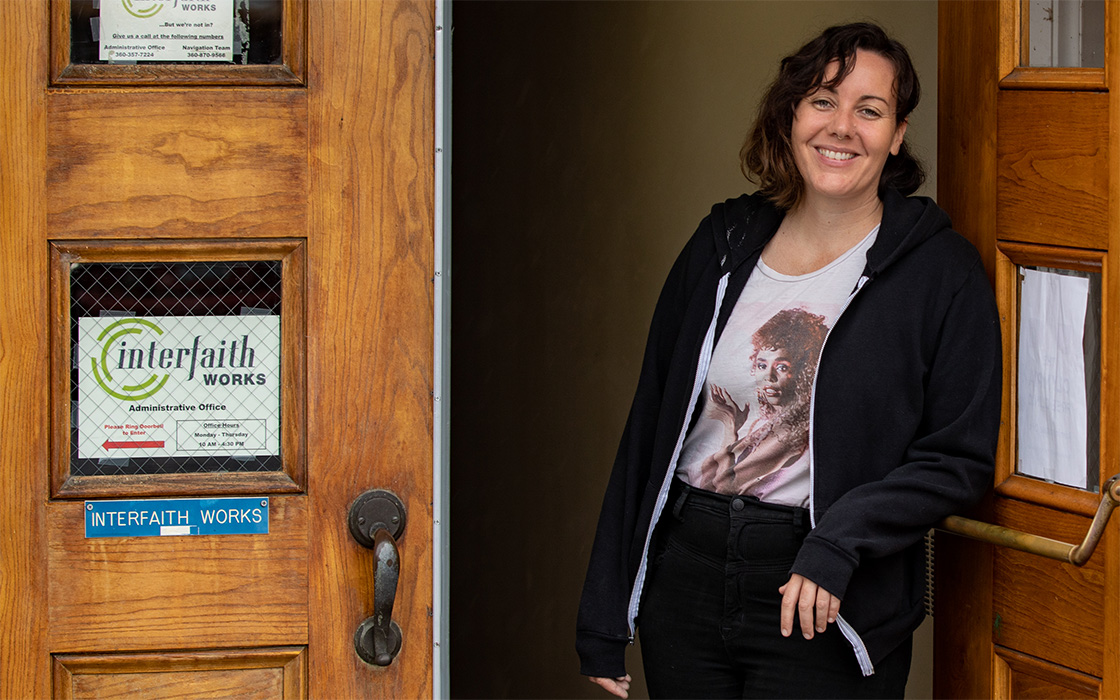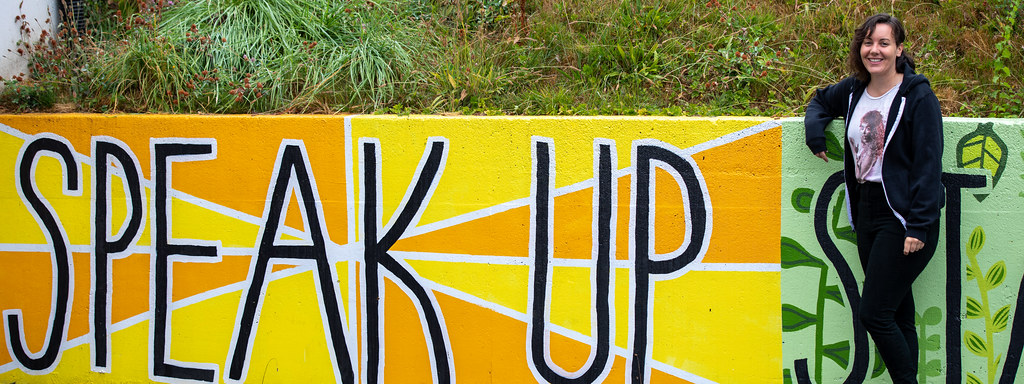
Using Her Voice
2021 Distinguished Alumna Meg Martin took a vow of silence that changed her life and allowed her to change the lives of countless others.
This Section's arrow_downward Theme Info Is:
- Background Image: ""
- Theme: "light-theme"
- Header Style: "purple_dominant"
- Card Height Setting: "consistent_row_height"
- Section Parallax: ""
- Section Parallax Height: ""
Meg Martin, '13 (MSW), took a vow of silence. “I had been a liar my whole life and I had been masking things, so I stopped talking,” she said. Martin did violate her vow, but only when the counselors or fellow patients at the treatment center urged her to participate in group sessions. Otherwise, she didn’t say a word for the rest of her stay in treatment.
Martin’s decision came from a need to understand herself, the life she’d led up to that point and the impact that had on others. Born in Colorado, Martin grew up in the suburbs of Denver. The last of three siblings and the only girl, Martin describes her upbringing as secure. “We were squarely middle-class,” she said.
The youngest Martin enjoyed playing soccer, making music and hanging out with friends. Outwardly, everything appeared to be fine. “I’m funny and fun and had this ability to connect with others,” she said. Martin’s personality helped hide her struggles with anxiety and depression from friends and family.
Lifetime Citizenship Award
The UW Tacoma 2021 Distinguished Alumni Award is not the only recognition Meg Martin, '13 (MSW), has received.
In 2017, she was presented with the Lifetime Citizenship Award by the League of Women Voters of Thurston County.
The adolescent and teenage years are a potent mix of hormones and transition. People are literally changing, both physically and mentally. Feelings of inferiority are rife as is peer pressure. The firm ground one once stood on caves in to reveal a yawning void. It’s during this time that Martin’s struggles bubbled up to the surface. “I started drinking and partying in seventh grade,” she said.
The situation may have spiraled out of control if not for one thing. “I was really involved in my soccer team,” said Martin. “I had a leadership position and that meant a lot to me.” Martin’s devotion to her teammates kept her from experimenting with other substances, including hard drugs.
Martin’s world abruptly changed during the summer between her junior and senior years in high school. “I was raped,” she said. The attack and resulting trauma sent Martin reeling, however most of what she was going through went unnoticed. It’s hard to say why exactly — Martin’s brothers were out of the house and her parents were struggling with the transition, plus through it all, Meg Martin kept up appearances and continued to be the same likable person.
Martin graduated from high school and enrolled in college. “I got into a relationship with a person who had a longtime heroin addiction,” said Martin. “The first time I ever did heroin, I felt safe, I felt quiet in my brain.” Martin liked the feeling and began using heroin more often.
Martin quit school. “I struggled really hard with my mental health in college and dropped in and out multiple times while I started using more and harder drugs,” she said. Her family life deteriorated. “I lived with both of my brothers on multiple occasions so I could try and get my act together,” said Martin. “My parents helped me in a lot of ways including paying for my psychiatric medication.”
Meg Martin on KNKX
Meg Martin was interviewed by KNKX's Gabriel Spitzer for the Sound Effect series in 2017.
She talks about the process of winning over those who were originally resistant to Interfaith Works's plans to build a 24/7 low-barrier shelter for homeless people.
The “resource bridges,” as Martin calls them, burned. “My family always loved me but they were no longer willing to help me financially,” she said. The turning point in Martin’s life is actually two distinct moments. The first came when Martin overdosed on heroin and was unresponsive for several minutes. Martin checked herself into rehab but initially fought the idea. “My family told me they would never talk to me again if I didn’t go,” said Martin. “I had (have) really close relationships with my family, and so that meant something to me.”
The second turning point, and perhaps the more impactful, came during a phone conversation Martin had with her mother. Martin’s boyfriend had been coming to visit her at the treatment center. “My mom asked if he had been there, and I lied and said he hadn’t,” said Meg Martin. The conversation got heated. “My mom told me that my boyfriend had stolen a ring that my dad had given her for their twenty-fifth anniversary,” said Martin.
Martin hung up the phone and called her boyfriend. “I asked if he stole it and he said ‘Yeah,’” said Martin. “I never talked to him again.”
After that, Martin went quiet. “I started listening, for maybe the first time in my life,” she said. “My family was really honest with me about how my behavior and my addiction impacted their lives. My brother told me he didn’t trust me to be alone with his son, and that was extremely painful because I think of my nieces and nephews as my own children.”
Starting Over
Martin moved to Olympia in 2007 shortly after completing treatment. “I had a friend who lived out here and they suggested I come out this way,” said Martin. As it turns out, this friend and Martin were once part of a band called Razzm’tazz. The group re-formed soon after Martin arrived in Olympia.
A few years later the band found itself doing shows in Missoula. Martin had attended the University of Montana (UM). “I decided to check with the Registrar’s Office while I was in town and they were like, “Girl, you only have seven credits left to graduate — just do it.’”
Martin had once considered getting a degree in creative writing. Her experience and the stories she heard from friends who also struggled with mental health and/or addiction, convinced her to change paths and pursue a degree in social work. Martin enrolled at UW Tacoma and ended up transferring her credits back to UM to complete her degree. While at UW Tacoma, Martin took a class from Senior Lecturer-Emeritus Teresa Holt-Schaad. “She told me that I needed to get my Master of Social Work and that she’d write me a letter of recommendation,” said Martin.

Martin started her Master of Social Work in the fall of 2011. Every student comes to class with their own history and their own ideas of how the world works. Martin was no different. “I remember telling Thom Diehm that I do things my own way and I acted like I was smarter than everybody,” she said. “I think he saw something in me that he wanted to make sure got moved in the right direction.”
“I had just really some amazing instructors that are still in my life today.”
Those two years weren’t easy. Martin did street outreach with the local homeless community in Olympia. “I’d come to believe that those in charge didn’t care about these people,” she said. Martin’s thinking ran up against a policy class she took as part of her master’s program. As part of an assignment, students had to either choose a campaign to volunteer for or speak at a city hall meeting about an issue important to them. “I told my professor — Janice Laasko (now Associate Professor Emerita) — that she’d have to convince me that policy advocacy was worth my time,” said Martin. “She said, ‘Okay, deal.’”
Martin went to a city hall meeting and spoke about the need for a needle exchange program in Olympia. At that time Martin did needle exchange through the Emma Goldman Youth and Homeless Outreach Project. Speaking truth to power appealed to Martin. She started attending more council meetings and offering comments about the city’s response to homelessness. “I was showing up all the time and learning and building relationships with the politicians and decision-makers in our town,” said Martin. “Through my degree I started learning more about processes and systems and how they fit together.”
Helping Others
While still a graduate student, Martin set out to talk with and distribute surveys to homeless individuals in Olympia. The year was 2013. Until that point, the City of Olympia relied on local religious organizations in the area to provide temporary shelter to those experiencing homelessness. These shelters had rules, rules that discouraged many who could benefit from having a place to stay from actually using these services.
A small group of outreach workers fanned out around the capital city in an attempt to understand why. “We literally went out on the street and distributed handwritten surveys,” said Martin. The responses provided valuable insight. Some shelters wouldn’t allow couples to stay together or had a no pets policy. Martin used this data to pitch the city council on the idea of building a permanent shelter. “We got some advice that if we wanted to ever get taken seriously, then we needed to partner with a more established organization,” she said.

Martin and the outreach workers teamed up with Interfaith Works. The organization is a “coalition of faith, religious, and spiritual communities that work together to serve the community through charitable, social, and educational endeavors.”
Martin took a position at Interfaith Works. “At the time we had three part-time employees and our annual budget was just under $200,000 a year,” said Martin. “Today, we have close to 70 employees and our annual budget for 2021 is $3.8 million.”
Martin has been with the organization for eight years. Interfaith Works has two main departments, Interfaith Relations and Homeless Services. In 2018 she served as Co-Interim Director for Homeless Services. A year later she stepped into the role of Executive Director.
Interfaith Works opened its first shelter in November of 2014. The organization currently operates two shelters in Olympia that have a combined total of 61 beds. Interfaith is in the process of constructing a new, larger shelter that is slated for completion in 2022. The space is urgently needed. The most recent point-in-time survey found that at least 1,100 people in Thurston County are experiencing homelessness.
For Martin, the crisis is about resources, but she believes the larger issue is philosophical. “Nothing will change if we don’t have a shared set of values that says that every person, regardless of circumstances, deserves to have their basic needs met,” she said.
Distinguished
Meg Martin is not quiet. That doesn’t necessarily mean she talks a lot or that she’s a poor listener. Martin’s vow of silence taught her how to hear others, their stories, triumphs and tragedies. She took this skill set to the streets of Olympia and is giving voice to those in our society who are often pushed to the margins. “I’ve built relationships with shelter guests over the years,” said Martin. “I know how they take their coffee and how they hum little songs when they wake up in the morning. I have these ridiculously beautiful, meaningful conversations with people. I mourn loved ones who died that had no one else to mourn with them and I help families get in touch with a relative who they’ve lost touch with. There’s just this intensely healing, beautiful, hilarious, you-can’t-make-this-s**t-up kind of stuff that happens, and that’s what keeps me going.”
Taking the time to listen transformed Martin’s life in numerous ways. In terms of UW Tacoma, her early hubris gave way to curiosity and a desire to learn from others. She’s had so much success that Teaching Professor Emeritus Thom Diehm nominated her for the 2021 Distinguished Alumni Award, which she was later awarded. “I am humbled by this honor and think of everyone who came before me, everyone who works on the front lines each day, and everyone who is coming up behind us that will carry change forward in new and beautiful ways,” she said. “I am also honestly shocked to be described as distinguished.”
This achievement is great, but it pales in comparison to the honor Martin received a few years ago. One of Martin’s brothers was set to graduate with his master’s degree. The family got together. At this point, Martin had been sober for a few years. “It was all hustle-bustle with people going in and out,” she said. At one point most of Martin’s family left, leaving Meg Martin alone with her nephew. “There was a moment of panic because I couldn’t be trusted around him,” she said. “And then I realized, I can now.”
Main Content
The Love of the Game
UW Tacoma Distinguished Alumni Award recipient Eric Barone took what he learned in the classroom and used it to create a hit video game.
News Tags on this arrow_upward Story:
- Alumni
- Community support
- School of Engineering & Technology

